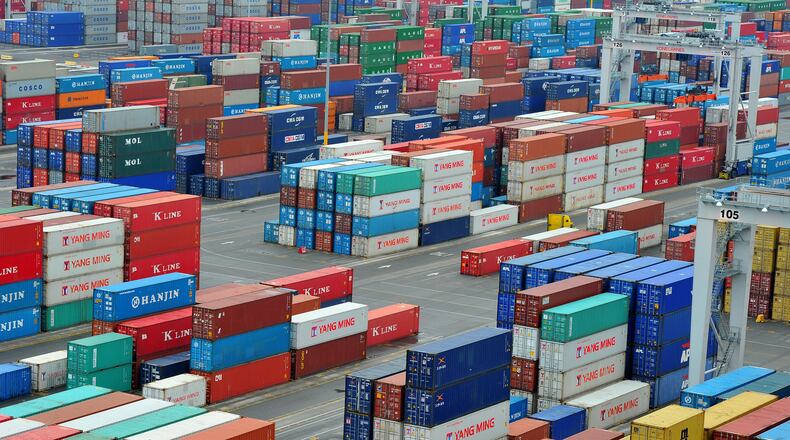Fueled by a growing population, a pipeline of projects already underway and the momentum of an ongoing expansion, the state’s economy will keep growing in the coming year, according to the annual forecast by the University of Georgia School of Business.
But with consumers and companies still pushing through the headwind of higher interest rates, the pace will slow, said Ben Ayers, dean of UGA’s Terry College of Business, on Friday.
He predicted the economy will expand at a 2.4% rate in 2025, down from 3.1% this year, in remarks to nearly 600 attendees gathered at the Georgia Aquarium for the school’s annual forecast luncheon.
“That reflects the pivot of the Federal Reserve,” which raised its benchmark rates to slow the economy and cool inflation, Ayers said. “Because the 2025 economic slowdown is due to a deliberate policy shift and not economic shock or factors outside our control, we think the slowdown will be gradual and not last long.”
The economy should reaccelerate in 2026, he said.
In the meantime, Georgia’s economy will still grow faster than the national average, with the state’s fastest hiring in homebuilding and health services, he predicted.
The number of new homes built in the state will increase by 9%, spurred by the pent-up demand of wannabe buyers who’ve been held back at least partly by the scarcity of homes listed for sale, Ayers said. That burst of building will also add enough to the supply of listings so that home prices — which have been a strain on first-time buyers — barely rise, he said.
The other obstacle for buyers has been mortgage rates, which climbed last year to their highest levels in two decades. But the Fed’s recent rate cuts have helped nudge them downward since then.
Rates will continue to moderate, Ayers said.
“We expect additional rate cuts in 2025,” he said. “These policy moves, the resilient labor market and recent economic development success will ensure that Georgia’s economy grows throughout 2025 and accelerates in 2026.”
Ayers did not mention the possible impact of changes in economic policy as Donald Trump regains the White House in the new year.
But any upbeat forecast must be tempered with uncertainty about those policies, warned John Silvia, president of Dynamic Economic Strategy, who also spoke to the group.
In his winning presidential campaign, Trump made a number of promises about the economy — higher tariffs, massive deportation, extension of tax cuts and deregulation of businesses. How those pledges play out will shape the course of the economy, he said.
“There are a lot of promises on the table, but what can actually get done?” Silvia said.
Moreover, any action taken can have consequences, some positive, some not so much, he said. “In economics, there are always linkages.”
Inflation has fallen dramatically from highs near 9% in 2022 to less than 3% now, but that progress could be threatened by tariffs, which are taxes on incoming goods from food to toys to auto parts.
“What do tariffs do? They basically raise the price,” Silvia said.
The incoming administration’s vow to deport millions of people could create labor shortages in some key areas, he said.
“Immigration policy is going to define our agricultural output,” Silvia said. “Tampa, where I am from, is highly dependent on immigrant labor. We are not going to get the job done, if you tell all the immigrants they have to leave.”
Credit: Richard Hamm/Terry College of Business
Credit: Richard Hamm/Terry College of Business
Credit: Natrice Miller / Natrice.Miller@
Credit: Natrice Miller / Natrice.Miller@
About the Author
Keep Reading
The Latest
Featured



